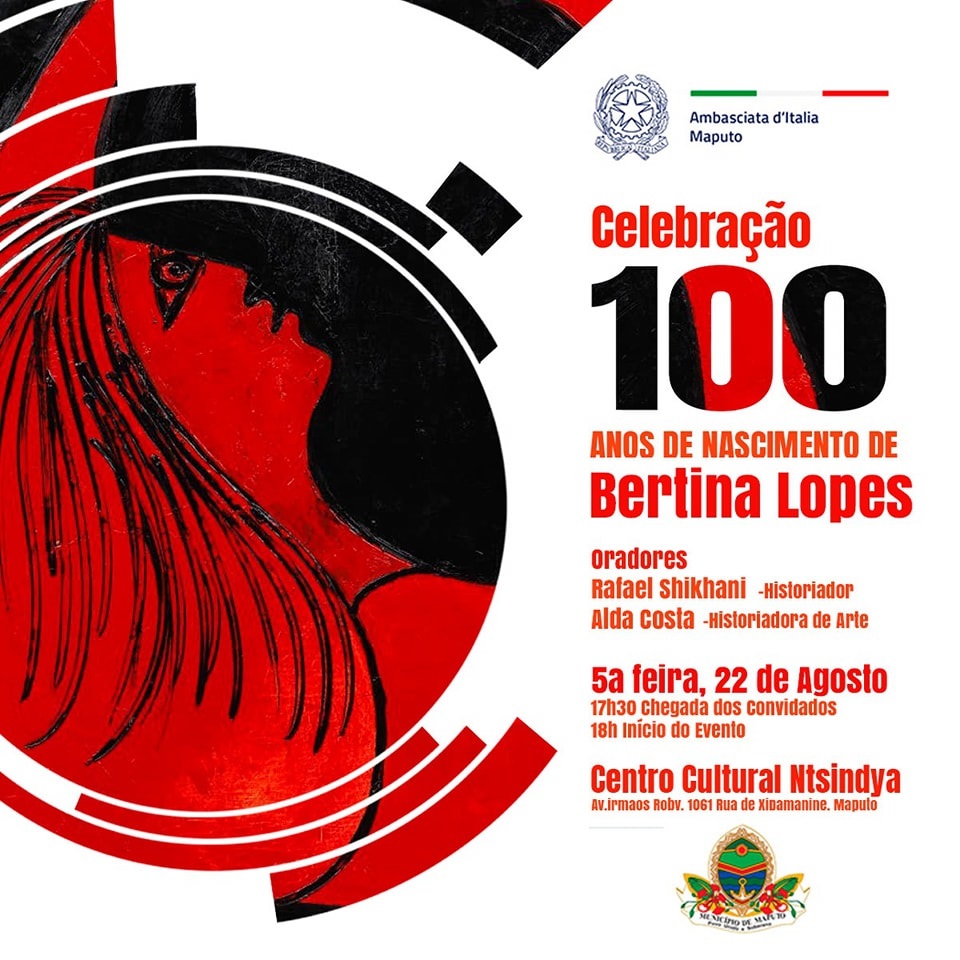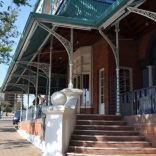Photo exhibition held in Maputo to mark 50th anniversary of China-Mozambique diplomatic ties
Mozambique: Celebrating Bertina Lopes on the centennial of her birth

Screen grab: Bonhams
In celebration of the 100th birthday of the Mozambican painter Bertina Lopes, the Italian embassy in Mozambique is this Thursday promoting a virtual guided tour of the life and work of this icon of Mozambican artistic creation.
A slideshow of Bertina Lopes’ studio and works will take place next to the large mural dedicated to her, with speeches by art historians Alda Costa and Rafael Shikani, starting at 6:00 p.m. at the Ntsindya Cultural Centre in Maputo.
- Thursday, August 22 at 6:00 p.m.
- Ntsindya Cultural Centre
- Avenida Irmāos Roby, 1061 Rua de Xipamanine, Maputo

Bertina Lopes was a painter, sculptor and activist whose work highlighted the social criticism and nationalistic fervour that influenced other Mozambican artists of her time. She was born on July 11 1924 in the capital of Mozambique, Lourenço Marques, today Maputo. The daughter of a Portuguese father and African mother, she left Mozambique early in her life to study art in Lisbon. Her travels to Portugal led her to meet other key Portuguese artists, such as expressionist Carlos Botelho and surrealist Marcelino Macedo Vespeira. Bertina was inspired by and engaged with the Avant-garde painting of Portuguese Modernism. It was there that she was able to view exhibitions of a diverse range of artists from South American graffiti to Western painters.
Lopes returned to Mozambique in 1953 and taught in a technical school. During this period of her life, cultural nationalism, embodied by the poets José Craveirinha and Noémia de Sousa, became a significant influence ideologically and artistically. Much of her work featured African fairy-tales and stories along with political events occurring at the time.
In Maputo, she forged close friendships with poets, writers, and political activists who were fundamental in forming her anti-colonial anti-fascist beliefs. Lopes’ activism forced her to leave Mozambique in 1961, returning to Lisbon to continue her artistic work. Prosecuted by the PIDE (Portuguese International and State Defence Police), she fled Portugal for Rome only two years later.
Despite facing difficulties as an African artist in Italy, Lopes filled a vital role in the capital, serving as the cultural attaché of her country’s Embassy. Lopes’ studio on Via XX Settembre where she lived and worked became famous for the dinners hosted by the artist and her husband Francesco Confaloni. The studio became a modern-day salon for African and European diplomats, journalists, and intellectuals. Here, she befriended many of the protagonists of the Italian art scene, including Marino Marini, Renato Guttuso, Carlo Levi and Antonio Scordia, as well as critics and museum directors.
With her Rome studio as her home-base, Lopes’ political militancy continued throughout her entire career. It was thanks to her close friendships with Mozambique presidents Joaquim Chissano and Armando Guebuza and with the opposing military factions of the Frelino e Renamo movements that she was able to facilitate mediation (alongside the Roman Catholic lay organization “Community di Sant’Egidio” and the United Nations) for the peace accords in 1992, ending 15 years of civil war in Mozambique.
Lopes represented Mozambique in numerous official cultural exhibitions worldwide, twice in the Venice Biennale, and received awards and citations for her efforts in promoting both art and peace. Her trailblazing work has been the subject of two exhibitions at the Gulbenkian Foundation in Lisbon (1973 and 1979) and two major retrospectives in Rome at Palazzo Venezia (1986) and Palazzo della Cancelleria Apostolica (2002). Marking the 10th anniversary of the artist’s death, Saltoun Gallery in Rome recently held a retrospective celebrating the artists’ 70-year-long career. Meanwhile, the Museo delle Civiltà in Rome earlier this year dedicated an exhibition to Lopes’ studio as a site of resistance, featuring a partial reconstruction of the space.
Bertina Lopes’ works are currently on display at the 2024 Venice Biennale.












Leave a Reply
Be the First to Comment!
You must be logged in to post a comment.
You must be logged in to post a comment.